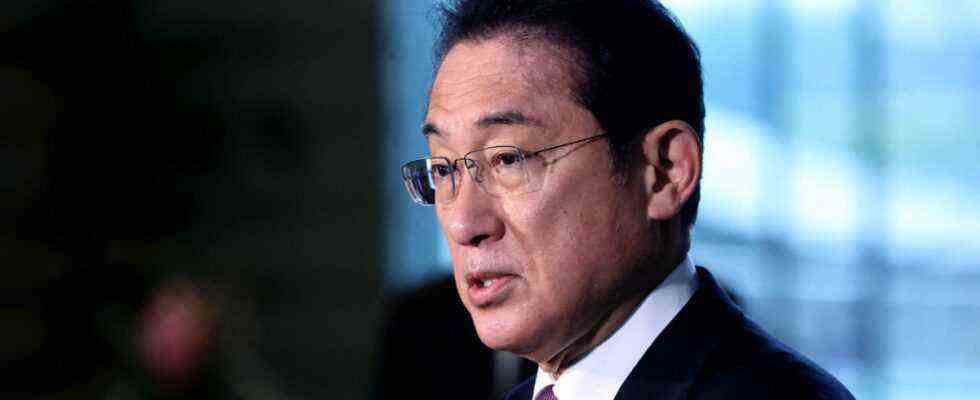As luck would have it, Fumio Kishida’s keynote speech fell on the day of the next North Korean missile tests. The party dictatorship had fired two short-range missiles into the sea, it was said on Monday morning before Japan’s Prime Minister Kishida took the lectern at the start of the next parliamentary term in Tokyo. It was North Korea’s fifth and sixth weapons test in the new year. Of course, Kishida had to say something about that. “Unacceptable” he called the actions. He committed himself to diplomatic exchanges. But he also stated that Japan could eventually defend itself with attacks against North Korea.
“We will take about a year to work out a new national security strategy, a national defense program and a medium-term plan for the development of the armed forces,” said Fumio Kishida, “during this process we will realistically consider all options. Including the so-called Ability to attack enemy bases without excluding them.” Because that would allow Japan to forestall nuclear attacks.
With its constant demonstrations of weapons, North Korea doesn’t make it easy for its neighbors
These are rough times in the Indo-Pacific. With its constant demonstrations of weapons, North Korea doesn’t make it easy for its neighbors. China is puffing up. Japan must ensure that it is adequately secured against the attacks, which hopefully never come. Nonetheless, that passage of Kishida’s speech on Monday seemed a little more brash than could be good for peace in the region.
Japan, aggressor and loser of the Second World War, once a colonial power in China and Korea, is bound by a pacifist constitution in its alliance with the USA, which prohibits the island state from any military attack. And Kishida’s LDP, the Liberal Democratic Party ruled by nationalist forces, has done little in recent years to come to terms with the past in a way that inspires confidence. On the contrary: rewriting the pacifist constitution is the declared goal in the circle of power around former Prime Minister Shinzo Abe.
Kishida is from Hiroshima, the city where the first US atomic bomb fell in 1945
And in this sense, Kishida now also rules, at least that is what the short passage in the late part of his keynote speech indicated. Fumio Kishida, 64, who has held the highest government office since the beginning of October, actually comes across as more of a gentle conservative who, at best, sides with hardliners like Abe for career reasons. Armament is not his topic, on the contrary. Kishida is from Hiroshima, the city where the first US atomic bomb fell in 1945. He is a fighter for a world free of nuclear weapons.
And in the first few months at the head of government, he acts like someone with whom everything should be fine: inequality in society, the bad economy, the pandemic. Recently, he even became the first prime minister since Abe in 2013 to visit the Japanese trade union federation Rengo to get the people there on his side.
During his 40-minute speech on Monday, he was again the nice Mr. Kishida. The caring newcomer who brings the country out of the depths of its predecessor with reason and without madness. Abe’s successor, Yoshihide Suga, dragged himself through his one-year term like an unimaginative crisis manager. When Kishida took his place, the controversial Tokyo Olympics were over, the vaccination rate looked good, and the number of infections was low. And soon the next huge Corona aid package was ready, which should total 107.6 trillion yen, the equivalent of around 823.35 billion euros.
The plans for the economy and climate seemed fuzzy, but basically good
Furthermore, Kishida enjoys the favor of the early phase of office. Because of Omikron, the number of infections is high again. But Omicron doesn’t put as much strain on the health system as previous mutants. And Kishida is doing something: The strict entry ban was extended until February, the booster policy was slightly accelerated: 18 to 64-year-olds now get the third vaccination dose seven instead of eight months after the second, over 64-year-olds six instead of seven. “Let’s overcome this national crisis,” Kishida called out to the plenum. And then he talked again about the “new capitalism” that he wants to introduce after the neoliberal years under Abe and Suga, about higher wages and “double investments” for a climate-neutral Japan in 2050. The plans seemed fuzzy, but basically good.
Until the prospect of the new security policy came up. Does Japan really want first strike defense? How would partners and neighbors react? Fumio Kishida’s beautiful promises resonated. But they could not distract from the right-wing goals in Japan’s political elite.

